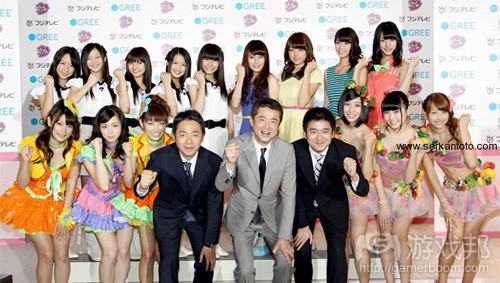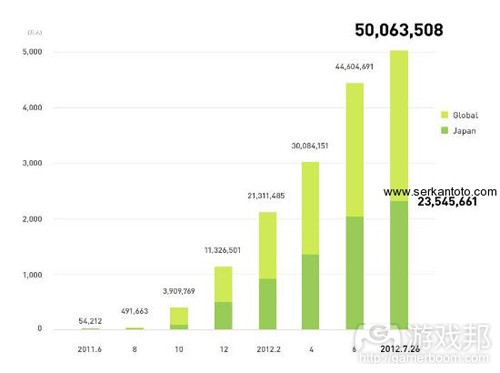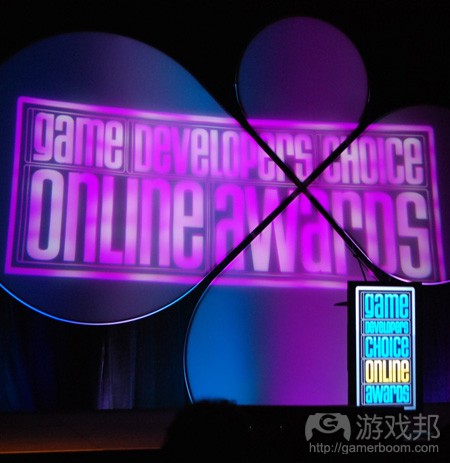每日观察:关注各地区Facebook用户盈利性(7.27)
1)日本网游协会日前发布报告显示,2011年整个日本网游市场(包括社交及非社交在线游戏)规模达54亿美元;PC和移动端日本社交游戏市场规模为36亿美元;日本网游开发商运营的国际项目产值为1.11亿。
值得注意的是,这里的日本社交游戏市场数据接近于日本内务省最近公布的32.6亿美元(但排除了规模更小的PC社交游戏领域)。
2)据日经新闻报道,日本社交游戏平台GREE在4-6月份这一季度的营业利润为2.55亿美元,同比上一季度下降20%左右。
虽然这一数据同比去年仍增长超过100%,但却是GREE自2008年上市以来首次出现同比上一季度利润下滑的现象。
不过GREE整个财年(截止2012年6月)营业利润仍可能达到10.7亿美元左右,并且这10.7亿美元利润基本上来自其日本市场手机端的社交游戏业务。
日经新闻指出,GREE这一财年的利润超过了日本电子商务巨头Rakuten(在日本有8000万用户),后者在上一财年(截止2011年12月份)利润为9亿美元。
3)据serkantoto报道,GREE日前宣布与日本富士电视台合作,面向智能手机平台,以开发多种基于富士电视台节目的移动内容。
这两者合作推出的首个产品是新社交卡牌战斗游戏《IDOL☆J@M》,该游戏将于今年夏天登陆GREE,其中植入了来自日本少女组合的100多个真人偶像、歌手和明星。GREE和富士电视台还考虑合作举办现实世界的大赛和音乐会,吸引GREE游戏玩家参与活动。
4)据Daily Ticker报道,虽然Zynga股票最近陷入低迷状态,但该公司首席执行官Mark Pincus及其他内部人员却已在数月前将部分股票套现而减少自己的损失。
Pincus及其他Zynga高管、股东在4月份出售了部分股票,以每股12美元的价格获得了5.16亿美元(游戏邦注:Zynga最近几周股票价格一直徘徊在5美元左右,但在本周公布4-6月财报结果时其股票一度下挫至3美元左右)。
在这些提前出售股票的Zynga人员当中,Pincus获利达2亿美元,还有一些人也因此获得了8位数的收益,如果他们也像其他股东一样直到现在才抛售股票,其所得收益就会大为缩水。
报道称有一家法律公司Newman Ferrara已介入调查Zynga究竟是有意隐瞒,还是无法向投资者提供关于其社交游戏所存在问题(例如游戏延期发布,及过度依赖Facebook平台等)的准确信息。日前也有一些分析师怀疑Zynga持续称霸社交游戏领域的可能性,并认为Zynga承诺太多,但兑现太少。
5)据serkantoto报道,NHN Japan旗下社交应用LINE自2011年6月23日在日本App Store发布以来,历时399天实现5000万次下载量。
LINE有2350万日本用户,如果保持目前增势,其用户规模很快就会越过日本最大实名制社交网站Mixi。
6)据games.com报道,《CastleVille》、《The Sims Social》、《Empires & Allies》、《Rage of Bahamut》、《Draw Something》日前获得GDC Online 2012“最佳社交网络游戏”大奖提名。
《Empires & Allies》另外还获得“最佳在线视觉艺术”奖项提名,《The Sims Social》还将与《星球大战:旧共和国》及《暗黑破坏神3》共同角逐“最佳在线技术”奖项。《CastleVille》、《Draw Something》还将竞争“最佳新网络游戏”奖项,《CityVille》则与《英雄联盟》、《魔兽世界》共同进入“最佳在线游戏”(Best Live Game)候选名单。
去年斩获“最佳社交网络游戏”大奖的是Playdom作品《Gardens of Time》,但今年Playdome游戏却并未出现在这一奖项候选名单之列。
7)Facebook最近财报显示,Facebook全球月活跃用户数量已达9.55亿,Facebook第二季度收益为11.8亿美元,同比去年增长32%,其中有5亿多美元来自移动平台。
两年前的Facebook北美用户占比30%,但现在这一数据已降至20%以下。除此之外,在过去24个月中,Facebook北美用户增幅仅35%,而其他地区的Facebook用户增幅却高达170%,其中亚洲Facebook用户增幅为165%,欧洲Facebook用户增幅为63%。
但这种现象并不令人意外,因为北美人口毕竟有限(3.5亿人),Facebook在该地区覆盖率已达53%(略高于去年底时的50%)。
欧美用户对Facebook广告商来说最具盈利性,但欧亚之外的其他地区Facebook用户(2.68亿)仅为该公司创造1.13亿美元收益。各地区Facebook每用户平均每季度创收水平如下:
*美国/加拿大:3.2美元
*欧洲:1.43美元
*亚洲:0.55美元
*其他地区:0.44美元(本文为游戏邦/gamerboom.com编译,拒绝任何不保留版权的转载,如需转载请联系:游戏邦)
1)Study: Japan’s Online Game Market Worth US$5.4B, Social Games Alone US$3.6B [Social Games]
by Dr. Serkan Toto
In Japan JOGA, the Japan Online Game Association, has released a summary of a new report on the status quo of Japan’s online gaming industry (as usual, the study is available only in Japanese).
Following the study from the Japanese government from a few days ago, the JOGA report also sizes up the domestic social gaming market in particular.
Here are the main bullet points of JOGA’s summary in translated form (details can be found in the report the association sells):
•Size of Japan’s entire online game market (social and non-social gaming combined):US$5.4 billion in 2011
•Size of Japan’s social game market on the PC and mobile devices (a subset of the above):US$3.6 billion in 2011
•Value of international business done by Japanese online game developers:US$111 million in 2011
What’s interesting is that this US$3.6 billion estimate for Japan’s social game market is in the same ball park as that of the Japanese government: according to the country’s Ministry Of Internal Affairs, the market was worth US$3.26 billion in 2011 – excluding the (much smaller) PC segment.(source:serkantoto)
2)Report: GREE Likely To See First Quarterly Loss Since 2008 IPO [Social Games]
by Dr. Serkan Toto
Business daily The Nikkei reports that GREE‘s operating profit for the April-June 2012 quarter has dropped by 20% q-o-q to around US$255 million.
That would still be an increase of over 100% y-o-y (and an incredible number by itself), but the number would mean that GREE saw, for the first time since its IPO in 2008, a quarter-on-quarter decline.
The Nikkei has also learned that sales have seemed to drop around 10% q-o-q to US$537 million.
Good news for GREE: according to the report, GREE’s operating profit will likely stand at around US$1.07 billion for the entire fiscal year (ending in June 2012), up 170% and in the projected range of US$1.02 billion and US$1.15 billion. This was anticipated a few days ago by GREE CEO Yoshikazu Tanaka and isn’t a big surprise.
US$1.07 billion profit: almost entirely with social games, on mobile phones only, and basically in Japan only.
The Nikkei notes that this number is higher than that of e-commerce behemoth Rakuten (80 million users in Japan alone), which ended its fiscal year in December 2011 with US$0.9 billion in profit.(source:serkantoto)
3)GREE Signs Deal With Fuji TV Station [Social Games]
by Dr. Serkan Toto
Japan is probably the only country in the world where even TV stations produce social games (more on that at a later time).
But sometimes even this nation’s mighty broadcasters need support, and today GREE announced a pretty interesting deal with Tokyo-based broadcaster Fuji TV.
Under the agreement, the two companies will co-develop various mobile content, exclusively on smartphones and (obviously) based on shows produced by Fuji TV. The potential benefit for GREE is clear: fresh IP in Japan’s increasingly competitive social gaming industry and a new marketing partner.
The first result of the tie-up will be a new social card battle game that will hit GREE this summer: IDOL☆J@M will feature cards of over 100 real-world “idols”, famous singers and stars from various Japanese girl groups (this sounds a lot like AKB48 Stage Fighter or Bandai Namco’s Idolmaster).
GREE and Fuji TV are also thinking about co-organizing real-world events and music concerts: what’s clever here is that these events might be limited to people who are actually playing GREE’s games.
GREE is one of Japan’s top TV advertisers.
This picture shows a few GREE and Fuji TV executives together with some of the singers that will star in IDOL☆J@M:(source:serkantoto)
4)Zynga CEO cashed out for $200M before stock implosion
by Eric Caoili
Though Zynga’s stock prices have plummeted since the company’s earnings report on Wednesday, CEO Mark Pincus and other insiders managed to reduce their damages from the crash by dumping shares months ago.
Pincus along with other Zynga executives and investors sold a portion of their shares in April, bringing in around $516 million at $12 a share, a couple of dollars above the stock’s initial IPO price, according to a report from Daily Ticker.
The company’s stock has floated around the $5 mark for a few weeks now, but after Zynga reported disappointing revenues and a third-straight quarter of losses for the April-to-June period yesterday, share prices plunged to a new low of $3.
Of those insiders who sold their stocks early, Pincus made the most and brought in $200 million from the sale, but several others also took home eight-figures. They would have made a lot less if they waited until today to dump their shares like many other investors.
The fortunate timing of their cashouts — conducted in the same quarter when Zynga’s's business appeared to deteriorate to the point that its share prices collapsed once investors were updated on its status — has raised a few eyebrows.
One law firm, Newman Ferrara, is already conducting an investigation into whether Zynga misrepresented or failed to provide investors information about problems with its social games, such as delayed launches or the company’s dependence on Facebook’s platform.
Earlier today, analysts expressed doubt that Zynga will be able to continue to dominate the social game space as it has for two years now, commenting “The bottom line is that Zynga over promised and significantly under delivered.” (source:gamasutra)
5)After 399 Days: LINE Hits 50 Million Downloads [Social Networks]
by Dr. Serkan Toto
In Japan LINE continues to amaze. Just a few weeks after hitting 40 million downloads, NHN Japan’s social app passed the 50 million mark (on July 26 Japanese time, to be exact).
LINE was first released in the Japanese App Store on June 23, 2011. It took 399 days to go from zero to 50 million downloads, which is obviously an amazing accomplishment.
23.5 million LINE users live in Japan – if this growth continues, LINE will soon have overtaken Japan’s biggest real-identity social network Mixi.
NHN Japan is currently trying to transform the relatively simple app into a full-fledged platform, which includes social games. The company monetizes the app by selling so-called stickers, large-sized images that convey emotions in a more fun way.(source:serkantoto)
6)CastleVille and The Sims Social lead the pack in GDC Online award nominations
by Brandy Shaul
Last year, Playdom’s Gardens of Time nabbed the title of “Best Social Network Game” at the Game Developers Choice Online Awards, but while Playdom’s titles may not be up for that award again this year, I’d be willing to wager that some of your favorite Facebook games are. The nominations for the GDC Online 2012 Awards are in, and games like CastleVille, the Sims Social and Empires & Allies lead the pack in the social gaming categories.
Those three games, along with Rage of Bahamut and Draw Something are up for Best Social Network Game, while Empires & Allies also received a nomination for Best Online Visual Arts. Meanwhile, the Sims Social has a chance to win the Best Online Technology award, but it will have to beat out some heavy hitters like BioWare’s Star Wars: the Old Republic and Blizzard’s Diablo III.
CastleVille and Draw Something are both up for Best New Online Game, and the now classic Zynga title CityVille has even received a nomination, going up against the likes of League of Legends and World of Warcraft for the title of Best Live Game. You might recognize a few other hopefuls, as Diamond Dash, Solitaire Blitz, Marvel: Avengers Alliance, Adventure World, Idle Worship and more all earned nominations in various categories, proving once again that it’s not just the most popular games that earn recognition.
While the Audience Award category hasn’t launched just yet, you can rest assured that you too will be given a chance to voice your opinion on your favorite online games, with the prizes going to the winners this October. For a full lineup of awards and nominees, head over the GDC Online Awards website.(source:games)
7)Facebook: U.S. users in the smallest regional group (not good for profits)
John Koetsier
Facebook posted quarterly earnings today and dumped a load of data into analysts’ laps.
User numbers hit a new high, with 955 million worldwide visiting the site at least once a month. And earning are slightly above estimates, coming in at $1.18 billion in revenue and 32 percent year-over-year growth. Over half a billion are coming from mobile devices.
One of the most interesting slides in the company’s quarterly earnings release, however, is this one:
Just two years ago, the United States and Canada made up 30 percent of Facebook’s users. Fast-forward to today, and the percentage is a little bit different: under 20.
Not only has the percentage changed, but the growth rate is almost negligible: only about 35 percent user growth over 24 months for the world’s social utility. That compares to 170 percent growth in Facebook’s “rest-of-the-world” category, which includes Africa, and 165 percent growth in Asia.
Even stodgy old Europe has 63 percent growth.
On the one hand, this is expected and normal. North America has a limited population, about 350 million, of which Facebook has about a 53 percent penetration rate. That’s slightly up from about 50 percent at the end of 2011.
On the other hand … why are those missing 164 million people not on Facebook? It’s a question the company should ponder … particularly because US and European internet users are worth more to advertisers than any others. Internet users are valued at perhaps $1,200 to advertisers, with Facebook making about an annualized $5 as of the first quarter of this year, and Google collecting $20 per user per year.
But not all internet users.
Zambia’s average annual income is $1,600. In the Phillipines, a college professor might make $500 dollars a month. I don’t think Barney’s New York is banging down their doors to sell $5,000 Gucci bags. Not too many iPhones being sold in Cambodia.
The point?
As Facebook’s growth has transitioned largely to the developing world: Asia, Africa, Oceania … the average value to advertisers per user is going down. Just check another slide from the Facebook deck:
The biggest chunk of Facebook users — “rest of world,” at 268 million — accounts for the smallest slice of Facebook’s revenue, $113 million. In fact, if you do that math, you can find the average value to Facebook, per quarter, of each user:
■US/Canada: $3.20
■Europe: $1.43
■Asia: $0.55
■Rest of world: $0.44
The good news is, if this quarter is any indication, Facebook could be bringing in about $12 per US and Canadian user per year. But there’s also bad news … and that’s everywhere else.
Europe can probably be fixed with more time and attention than the US-centric Facebook has given it so far. Starting an office in London may help with that. But Asia? And the rest of the world? Those per-capita incomes aren’t coming up to U.S. standards any time real soon.(source:venturebeat)















































 闽公网安备35020302001549号
闽公网安备35020302001549号